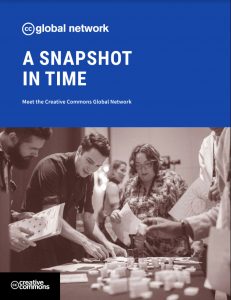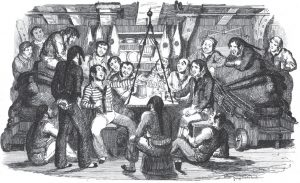A Snapshot in Time: A Look at the Creative Commons Global Network
mercredi 10 février 2021 à 15:24 In 2017, the structure of the Creative Commons Global Network (CCGN) was finalized. After two years of implementing structural changes flowing from this, it felt timely to have a conversation with CCGN members. We wanted to gather feedback and carry out research on the perspectives of network members, at a specific point in time. What was working? What wasn’t working? Why are people here?
In 2017, the structure of the Creative Commons Global Network (CCGN) was finalized. After two years of implementing structural changes flowing from this, it felt timely to have a conversation with CCGN members. We wanted to gather feedback and carry out research on the perspectives of network members, at a specific point in time. What was working? What wasn’t working? Why are people here?
We drafted a research brief in April 2019 which set out what aspects we wanted to learn about and how to collect the information. Open community member Isla Haddow-Flood from South Africa conducted a survey and interviews between December 2019 and February 2020. Many of our CCGN members were involved in this and we are grateful! In this blog, we’ve outlined some of the findings. For the full report, please follow this link. For the executive summary, follow this link.
A sense of belonging
A key motivation for people joining and actively engaging in the CCGN ties to belonging. People are driven to be part of a group working together towards a common goal. Our members value each other and value the ability to exchange ideas and expertise. Most important is the feeling of being part of something bigger.
“The main element is people. To meet the right people. To convince them that CC is important and can be an alternative for institutions. I always believe that people are at the core of everything.”
Common threads for belonging were:
- Doing important work together
- Working for the greater good of society
- Trust
- Friendship and community
- Finding one’s ‘tribe’
- Impact and recognition, both locally and globally
Involvement in the movement
“I am doing this work as an implementer, creator, trainer, and license user because I believe in the power of sharing and the content. I do it because it is good for society.”
Reasons why people are involved, not only with the Creative Commons community but with the CCGN specifically, are plentiful. Some of the main drivers include building and maintaining a global community for the good of society, as well as advocating for change on a local and global level. People are engaged and involved in the work of the CCGN to make the world a better place. Our community is one of advocates, implementers, project creators, community builders, and many others. We come together around the idea of open sharing.
Common threads for involvement were:
- Advocacy and policy
- Furthering the good of society
- Building local community and being part of a global community
- Peer to peer learning
- Meeting one’s ‘heroes’
Opportunities to improve
Several needs were identified that need to be addressed so that the CCGN can be as valuable as possible to its members, allowing them to reach their full potential as participants in the open movement.
Implementation plans to address these needs will be incorporated into the overall work plans for the CCGN in 2021 and 2022. Major needs identified by the research include:
- Pathways and processes to guide people and institutions into and through the Network
- Coordination and discoverability of existing resources for Network members to access and reuse, ranging from documentation to individual expertise
- Detailing of recommended official positions within each Chapter, to allow for better internal Chapter structures and cross-Chapter collaboration
- Formalizing peer-to-peer connections to enable pathways to Network entrance, opportunities for knowledge sharing, and mentorship
- Exploring opportunities for regional coordination
- Having communications and resources more broadly available in languages other than English
For more information, please visit the CCGN website. Finally, we encourage anyone who may be interested to download and read the full report. Not a CC Global Network member? Get involved today as an individual member or by joining a CC Chapter!
The post A Snapshot in Time: A Look at the Creative Commons Global Network appeared first on Creative Commons.


 : Featured image has icons by
: Featured image has icons by 